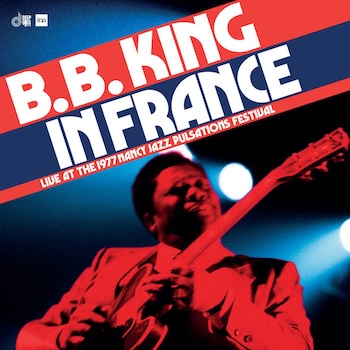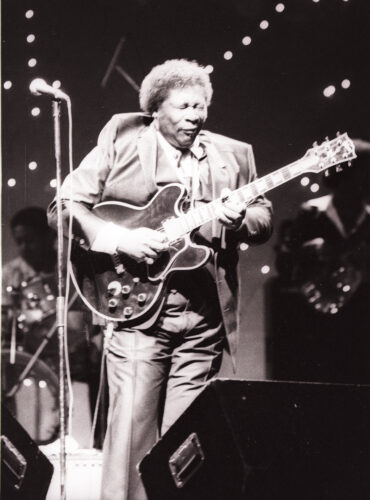Album Review: “B. B. King in France” — A Wizard of the Blues Casts His Spell
By Michael Ullman
On his live recordings, B.B. King displayed his brilliant use of stagecraft and pacing. He was one might call a mastro of manipulation.
B. B. King in France (Live at the 1977 Nancy Jazz Pulsations Festival) (2 LPs, Elemental Music)
 In 1983, I helped bring blues master B.B. King to Tufts University. Of course, it generated a memorable series of events. In the afternoon, King held a workshop. Accompanied by his guitar and a small amp, he talked about his career and about the blues in general. He demonstrated various styles, historical and current, of blues guitar playing: he did a creditable version of Blind Lemon Jefferson. He told us what he could do and, more remarkably, what he could not. His distinctive style was born of drawing on his strengths and limitations. (One example was how he pulled off the typical vibrato of a string player: he couldn’t make his wrist move in the conventional way so he bent the strings as a substitute.) He played his characteristic pickup phrase and then asserted, both proudly and realistically, that every blues listener recognizes that phrase as B.B. King’s.
In 1983, I helped bring blues master B.B. King to Tufts University. Of course, it generated a memorable series of events. In the afternoon, King held a workshop. Accompanied by his guitar and a small amp, he talked about his career and about the blues in general. He demonstrated various styles, historical and current, of blues guitar playing: he did a creditable version of Blind Lemon Jefferson. He told us what he could do and, more remarkably, what he could not. His distinctive style was born of drawing on his strengths and limitations. (One example was how he pulled off the typical vibrato of a string player: he couldn’t make his wrist move in the conventional way so he bent the strings as a substitute.) He played his characteristic pickup phrase and then asserted, both proudly and realistically, that every blues listener recognizes that phrase as B.B. King’s.
Later, I had dinner with him at a dean’s house. I was probably invited there in case the conversation lagged. No problem. B.B. King sat at the head of the table and conversed brilliantly, bringing the others around him into the talk, calling on us as if we were soloists in his band. After dinner, he stood up and gave a speech to the dean. He said he grew up poor on a plantation, and that he appreciated being treated with such respect. He thanked us!! I was in awe of King as I walked him to the concert hall.
Listening to this set of live B.B. King, I am reminded both of his mastery and his modesty. He was 51 in 1977, a veteran of decades of performing in the equivalent of juke joints as well as, more recently, theaters like the Regal in Chicago as well as college campuses. Perhaps, because of his endless touring, it’s best to hear his live recordings, Live at the Regal, Live in Cook County Jail, Live and Well, and now this newly issued B. B. King in France (Live at the 1977 Nancy Jazz Pulsations Festival). He is nothing if not theatrical: a magus at pacing and pulling off dramatic gestures on his guitar. He will build and build in volume and tension and then, suddenly, let the bottom drop out and play at a whisper. You can hear the audience gasping. He can play blues so slowly that he seems to be crawling along — yet the audience hangs on every note. And then he lets an uptempo piece rip.

B.B. King performing at Tufts University in 1983. Photo: Michael Ullman
Even his entrances are dramatic. On B.B. King in France, he is accompanied by a seven-piece band that sounds better than any horn section I have heard him with. They open with a slow version of Thelonious Monk’s “Blue Monk” that allows King to stride on stage and pick up his guitar. He plays a few notes tentatively on “Blue Monk”, as if testing the sound, and then plays in his best plaintive style. When he is ready, King hushes the band, takes a groaning solo that is a highlight of the set and then leads the band into an uptempo version of “Caldonia”. Thelonious Monk meets Louis Jordan. It all sounds just so right. When King lets the saxophonists solo, he plays behind them with a vibrato so strong that it seems to wobble.
What follows are spacious versions of some of King’s greatest hits, beginning with “Sweet Little Angel”. King takes a long stunning solo on this tune, some of it pianissimo. It’s almost five minutes before he starts singing about his sweet little angel and the way she spreads her wings. He follows with an uptempo “I Like to Live the Love”. This concert is a joyous occasion. The audience members often clap along. They are treated to new version of “The Thrill is Gone” and “Sweet Sixteen”. Less expected is King’s take on Stevie Wonder’s “To Know You is to Love You”, which he offers as an encore. The collection ends with Shirrell Sutton’s “Have Faith”, a tune he recorded on Lucille Talks Back.
An outro follows that makes this listener feel as if he were there. On this live set, we hear more of the band than usual; they are featured in an uptempo riff called “Blues Instrumental” that King uses to walk himself off the stage. Elsewhere, the sextet helps with transitions and provides plenty of excitement of its own. On B. B. King in France the bluesman brings us confidently into his world. King was a brilliant master of stagecraft and pacing, what one might call a mastro of manipulation. He convinces this listener that, as he says, “in the song every line is real.”
For over 30 years, Michael Ullman has written a bimonthly jazz column for Fanfare Magazine, for which he also reviews classical music. He has emeritus status at Tufts University, where for 45 years he taught in the English and Music Departments, specializing in modernist writers and nonfiction writing in English, and jazz and blues history in music. He studied classical clarinet. The author or co-author of two books on jazz, he has written on jazz and classical music for the Atlantic Monthly, New Republic, High Fidelity, Stereophile, Boston Phoenix, Boston Globe, and other venues. He plays piano badly.


Brilliant. And enjoyed.